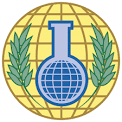THE HAGUE, Netherlands — 4 July 2017 — The Director-General of the Organisation for the Prohibition of Chemical Weapons (OPCW), Ambassador Ahmet Üzümcü reinforced the need to take every necessary action to protect and strengthen the global norm against chemical weapons during his visit to Tehran, Islamic Republic of Iran from 2 to 3 July.
 During the visit, the Director-General held a number of meetings with senior officials from the Government of Islamic Republic of Iran. The Director-General met with Iran’s Minister of Foreign Affairs, H.E. Dr Javad Zarif, on 2 July, where the discussion focused on the progress and challenges related to the implementation of the Chemical Weapons Convention, including OPCW activities regarding Syria. He also met with Deputy Minister for Legal and International Affairs, Dr Seyed Abbas Aragchi; and Deputy Secretary of the Supreme National Security Council of Iran, Mr. Ameer Saeed Iravani.
During the visit, the Director-General held a number of meetings with senior officials from the Government of Islamic Republic of Iran. The Director-General met with Iran’s Minister of Foreign Affairs, H.E. Dr Javad Zarif, on 2 July, where the discussion focused on the progress and challenges related to the implementation of the Chemical Weapons Convention, including OPCW activities regarding Syria. He also met with Deputy Minister for Legal and International Affairs, Dr Seyed Abbas Aragchi; and Deputy Secretary of the Supreme National Security Council of Iran, Mr. Ameer Saeed Iravani.
The Director-General spoke about the milestone represented by the 20th anniversary of the Convention and the founding of the OPCW in his closing remarks for the Sixth Regional Training Course on Assistance and Protection against Chemical Weapons for Asian States Parties co-organised by the Government of Iran and the OPCW. He emphasised that “improving our ability to prepare for and respond to chemical weapons attacks must be matched with greater collaboration and a recommitment to the international norm against chemical weapons”.
Ambassador Üzümcü while referring to the 30th anniversary of the chemical weapons attack in Sardasht and recent uses in Syria reaffirmed the commitment “to exclude completely the possibility of the use of chemical weapons” enshrined in the Chemical Weapons Convention (CWC) in his remarks to the Institute for Political and International Studies at the Iranian Ministry of Foreign Affairs on July 3.
He called attention to incidents in Syria where this resolve continues to be “defiantly challenged” and further underscored: “No religion or culture rationalises such brutality. The Organisation not only has the mandate but an absolute responsibility to do everything within its capacity to confront this situation. Giving up the effort to uncover the truth will be an affront to the victims of chemical weapons everywhere.”
The Director-General also visited the Tehran Peace Museum where he met with victims of chemical weapons and listened to their painful recollections and learned about what survivors have done to try to rebuild their lives.
Background
The Islamic Republic of Iran joined the Chemical Weapons Convention in 1997.
Iran actively engages in OPCW projects in the areas of capacity-building; assistance and protection; and national implementation and development. It also participates in training courses for medical professionals for the treatment of chemical casualties.
The training course is jointly organised by the Technical Secretariat and the Government of Iran and serves as a final course to complete the basic training programme for this region. This course is designed to train first responders – with priority given to Police officers – on emergency response to chemical incidents and the participants are expected to attend the advanced course, which will be held in Seoul, South Korea in September 2017. The training brings together representatives from States parties in the region and around the world and serves as a forum for enhancing capacity to respond to chemical weapons incidents while providing the opportunity to discuss practical challenges in building an effective response system.
As the implementing body for the Chemical Weapons Convention, the OPCW oversees the global endeavour to permanently and verifiably eliminate chemical weapons. Since the Convention’s entry into force in 1997 – and with its 192 States Parties – it is the most successful disarmament treaty eliminating an entire class of weapons of mass destruction.
Ninety-five per cent of all chemical weapon stockpiles declared by possessor States have been destroyed under OPCW verification. For its extensive efforts in eliminating chemical weapons, the OPCW received the 2013 Nobel Prize for Peace.
